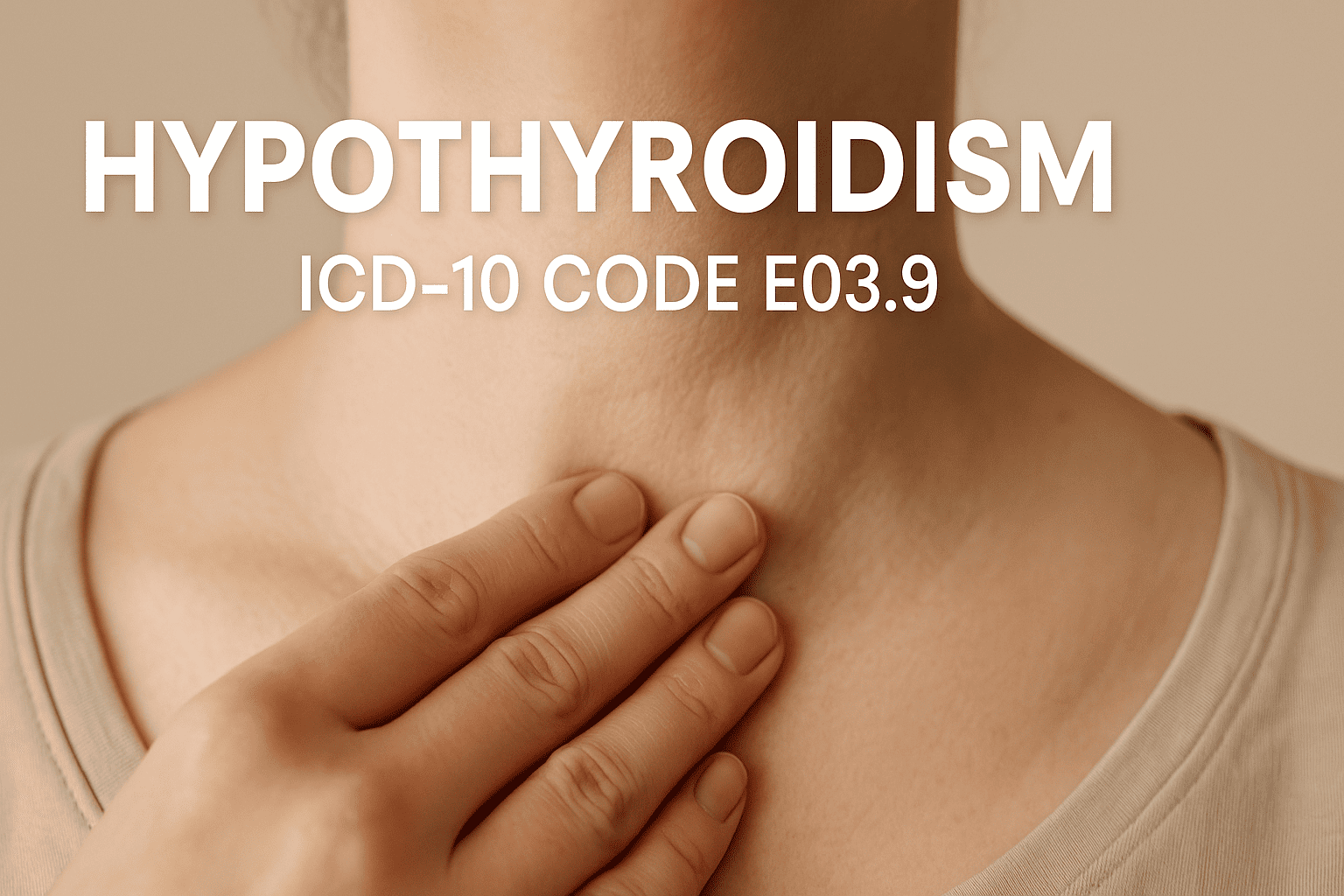Updated on: July 23, 2025
Hypothyroidism is a common endocrine disorder in which the thyroid gland fails to produce sufficient thyroid hormones, leading to a wide range of metabolic and systemic symptoms. The ICD-10 code E03.9 is used when hypothyroidism is diagnosed but the specific cause or type is not documented in the medical record.
ICD-10 Code E03.9: Explained
-
E03 → Other hypothyroidism
-
.9 → Unspecified
This code is appropriate when:
-
The provider confirms hypothyroidism
-
No etiology (autoimmune, post-surgical, drug-induced, etc.) is stated
-
The patient has no documented complications or specific type
⚠️ Note: Avoid E03.9 if the cause is known. Use more specific E03.x codes whenever possible.
Specific ICD-10 Codes for Common Hypothyroidism Types
| ICD-10 Code | Condition |
|---|---|
| E03.0 | Congenital hypothyroidism with diffuse goiter |
| E03.5 | Atrophic hypothyroidism |
| E03.2 | Hypothyroidism due to medications or radiation |
| E89.0 | Postprocedural hypothyroidism (e.g., after thyroidectomy) |
| E03.9 | Hypothyroidism, unspecified |
When to Use E03.9
Use E03.9 only when:
-
Hypothyroidism is confirmed by lab tests (TSH, T3, T4)
-
No specific cause (autoimmune, iatrogenic) is recorded
-
There are no concurrent thyroid nodules, goiters, or surgery
-
Patient is under treatment or evaluation for nonspecific hypothyroid symptoms
Example Clinical Note:
“Patient presents with fatigue, cold intolerance, and dry skin. Labs show elevated TSH and low free T4. No known thyroid surgery or autoimmune diagnosis. Started on levothyroxine. Assessment: Hypothyroidism, unspecified (E03.9).”
Symptoms Supporting E03.9 Documentation
Ensure clinical notes reference at least 2–3 of these symptoms:
-
Fatigue, weight gain
-
Cold intolerance
-
Constipation
-
Menstrual irregularities
-
Hair thinning or dry skin
-
Depression, memory impairment
-
Bradycardia
These support the necessity of TSH testing and long-term thyroid hormone therapy.
Diagnostic & Treatment Workflow
-
Initial Assessment: Evaluate symptoms and family history
-
Labs: TSH, Free T4, T3, anti-TPO antibodies
-
Imaging (if needed): Thyroid ultrasound for nodules/goiter
-
Treatment: Levothyroxine or other hormone replacement
-
Monitoring: Regular TSH checks every 3–6 months
🩺 Tip: If the cause (e.g., Hashimoto’s) becomes known later, update the code accordingly (e.g., E06.3 + E03.8).
Commonly Paired ICD-10 Codes
| Diagnosis | ICD-10 Code |
|---|---|
| Hypothyroidism, unspecified | E03.9 |
| Long-term use of levothyroxine | Z79.890 |
| Fatigue or lethargy | R53.83 |
| Goiter (if present) | E04.9 |
| Iron-deficiency anemia | D50.9 |
| Depression (linked symptomatically) | F33.0–F33.9 |
Documentation Tips for E03.9
To code E03.9 correctly, the provider should document:
-
Diagnosis of “hypothyroidism” explicitly
-
Absence of known etiology
-
Relevant TSH and thyroid hormone levels
-
Initiation or continuation of thyroid hormone therapy
-
Follow-up schedule or endocrine referral, if applicable
Risk Adjustment and Clinical Importance
-
E03.9 is not an HCC diagnosis, but poor documentation may lead to under-coding and treatment delays.
-
Inaccurate use of E03.9 when etiology is known may trigger payer chart reviews.
-
Use of AI medical scribes like DocScrib ensures that thyroid labs, meds, and diagnostic reasoning are captured in real time.
👉 Learn how DocScrib automates endocrine documentation
How DocScrib Helps with Endocrine Care Coding
In busy primary care or endocrine settings, providers often overlook updates to diagnoses when lab results arrive later. DocScrib:
-
Detects thyroid lab results from EHR feeds
-
Suggests specific E03 codes based on labs and notes
-
Reminds providers to document cause if available
-
Streamlines follow-up scheduling and medication adjustments
Frequently Asked Questions
Can I use E03.9 for subclinical hypothyroidism?
Yes, if symptoms are present and treatment is initiated. Otherwise, R94.6 (abnormal thyroid function studies) may be more appropriate for observation without diagnosis.
Should I use E03.9 if the patient had thyroid surgery years ago?
No. Use E89.0 for postprocedural hypothyroidism.
What if the patient is on levothyroxine but denies symptoms?
If previously diagnosed, E03.9 is appropriate. Document treatment status and absence of symptoms for chronic management tracking.
Conclusion
ICD-10 Code E03.9 is widely used in primary care for patients with confirmed hypothyroidism of unknown cause. However, clinicians should always aim to identify and document a more specific subtype when possible. Leveraging documentation support tools like DocScrib ensures that thyroid diagnoses are accurately coded, treatment decisions are fully recorded, and follow-up care is optimized.
Looking to automate thyroid care documentation and coding?
👉 Book a free demo with DocScrib now
